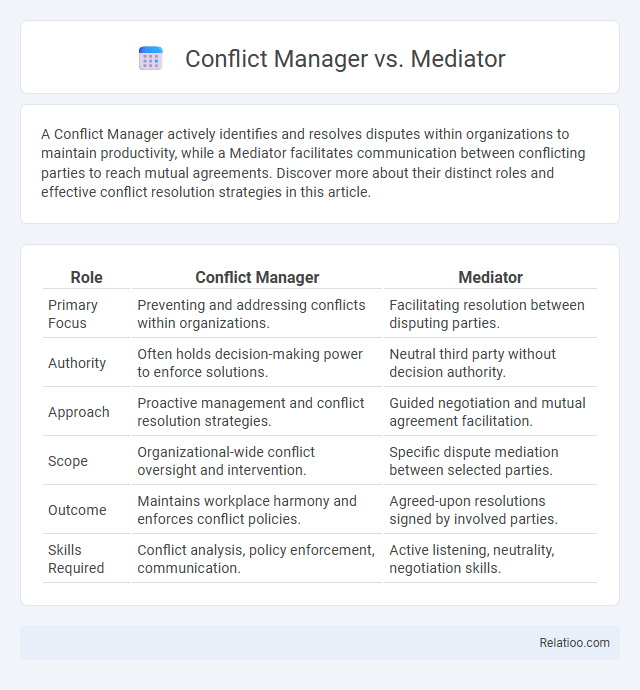A Conflict Manager actively identifies and resolves disputes within organizations to maintain productivity, while a Mediator facilitates communication between conflicting parties to reach mutual agreements. Discover more about their distinct roles and effective conflict resolution strategies in this article.
Table of Comparison
| Role | Conflict Manager | Mediator |
|---|---|---|
| Primary Focus | Preventing and addressing conflicts within organizations. | Facilitating resolution between disputing parties. |
| Authority | Often holds decision-making power to enforce solutions. | Neutral third party without decision authority. |
| Approach | Proactive management and conflict resolution strategies. | Guided negotiation and mutual agreement facilitation. |
| Scope | Organizational-wide conflict oversight and intervention. | Specific dispute mediation between selected parties. |
| Outcome | Maintains workplace harmony and enforces conflict policies. | Agreed-upon resolutions signed by involved parties. |
| Skills Required | Conflict analysis, policy enforcement, communication. | Active listening, neutrality, negotiation skills. |
Understanding the Roles: Conflict Manager vs Mediator
Conflict managers focus on identifying, analyzing, and resolving disputes within organizations to maintain a productive environment, often implementing long-term strategies to prevent future conflicts. Mediators act as neutral third parties facilitating communication between disputing individuals or groups, guiding them toward mutually agreeable solutions without imposing decisions. Understanding these roles reveals that while conflict managers oversee ongoing conflict resolution systems, mediators intervene in specific disputes to help you reach consensus efficiently.
Key Responsibilities of a Conflict Manager
A Conflict Manager primarily handles the identification, analysis, and resolution of disputes within organizations by developing effective conflict management strategies and promoting positive communication among conflicting parties. Key responsibilities include assessing conflict situations, facilitating negotiation processes, implementing conflict resolution techniques, and monitoring outcomes to prevent escalation. Unlike mediators who act as neutral third parties during disputes, Conflict Managers take a proactive role in creating and maintaining a productive work environment through continuous conflict assessment and management.
Essential Duties of a Mediator
A mediator primarily facilitates communication between disputing parties to help them reach a mutually acceptable resolution without imposing decisions, emphasizing neutrality and confidentiality. Unlike conflict managers who actively strategize and implement conflict resolution plans within organizations, mediators focus on guiding dialogue, understanding interests, and fostering collaboration. Essential duties of a mediator include preparing parties for negotiation, managing the mediation process, and assisting in drafting agreements that reflect consensual terms.
Main Differences Between Conflict Managers and Mediators
Conflict managers focus on identifying, preventing, and resolving disputes through strategic approaches within organizations, emphasizing long-term conflict reduction and process improvement. Mediators act as neutral third parties who facilitate communication and negotiation between disputing parties to reach a voluntary, mutually acceptable agreement. The main difference lies in the conflict manager's role as an ongoing organizational position versus the mediator's role as a temporary, impartial facilitator specifically guiding parties toward resolution.
Required Skills: Conflict Manager vs Mediator
Conflict managers require strong analytical skills, emotional intelligence, and decisiveness to identify underlying issues and implement long-term solutions effectively. Mediators excel in communication, neutrality, active listening, and negotiation skills to facilitate constructive dialogue and mutual agreement between disputing parties. Both roles demand empathy and problem-solving abilities, but conflict managers focus more on strategic resolution, while mediators emphasize collaboration and consensus-building.
When to Use a Conflict Manager
A Conflict Manager is most effective in ongoing organizational disputes requiring structured resolution frameworks and consistent intervention strategies. Unlike Mediators who facilitate dialogue between parties in specific, often one-time conflicts, Conflict Managers implement proactive conflict resolution policies and monitor workplace dynamics continuously. Employ a Conflict Manager when the goal is to institutionalize conflict management, reduce recurring disputes, and maintain long-term organizational harmony.
When Mediation is the Best Approach
Mediation is the best approach when parties seek a neutral third party to facilitate open communication and mutual agreement without imposing decisions, often suited for disputes requiring confidentiality and preservation of relationships. A mediator acts as an impartial facilitator, unlike a conflict manager who may adopt a more directive role within organizations to identify, prevent, and resolve conflicts proactively. In scenarios where emotional tensions are high and collaboration is essential, mediation provides a structured yet flexible process to achieve lasting resolutions.
Benefits of Conflict Management in the Workplace
Conflict managers facilitate structured resolution processes, reducing workplace tension and enhancing team collaboration. Mediators provide impartial guidance that encourages open communication, fostering mutual understanding and quick dispute resolution. Effective conflict management leads to improved employee morale, increased productivity, and a healthier organizational culture.
Advantages of Mediation in Conflict Resolution
Mediation offers a neutral environment where a mediator facilitates open communication, enabling parties to reach mutually beneficial agreements without the need for litigation. You experience faster conflict resolution, reduced costs, and preservation of relationships compared to traditional conflict manager interventions or arbitration. This collaborative process empowers all parties to actively participate in crafting flexible solutions tailored to their unique needs.
Choosing the Right Professional for Conflict Resolution
Selecting the appropriate professional for conflict resolution depends on the specific needs of the situation; a Conflict Manager specializes in assessing and managing ongoing disputes within organizations, implementing strategies to prevent escalation. A Mediator acts as a neutral third party to facilitate dialogue and negotiate mutually acceptable agreements between conflicting parties, often in legal or personal disputes. Understanding these distinct roles ensures effective resolution by matching the conflict's scope and context with the right expertise.

Infographic: Conflict Manager vs Mediator
 relatioo.com
relatioo.com